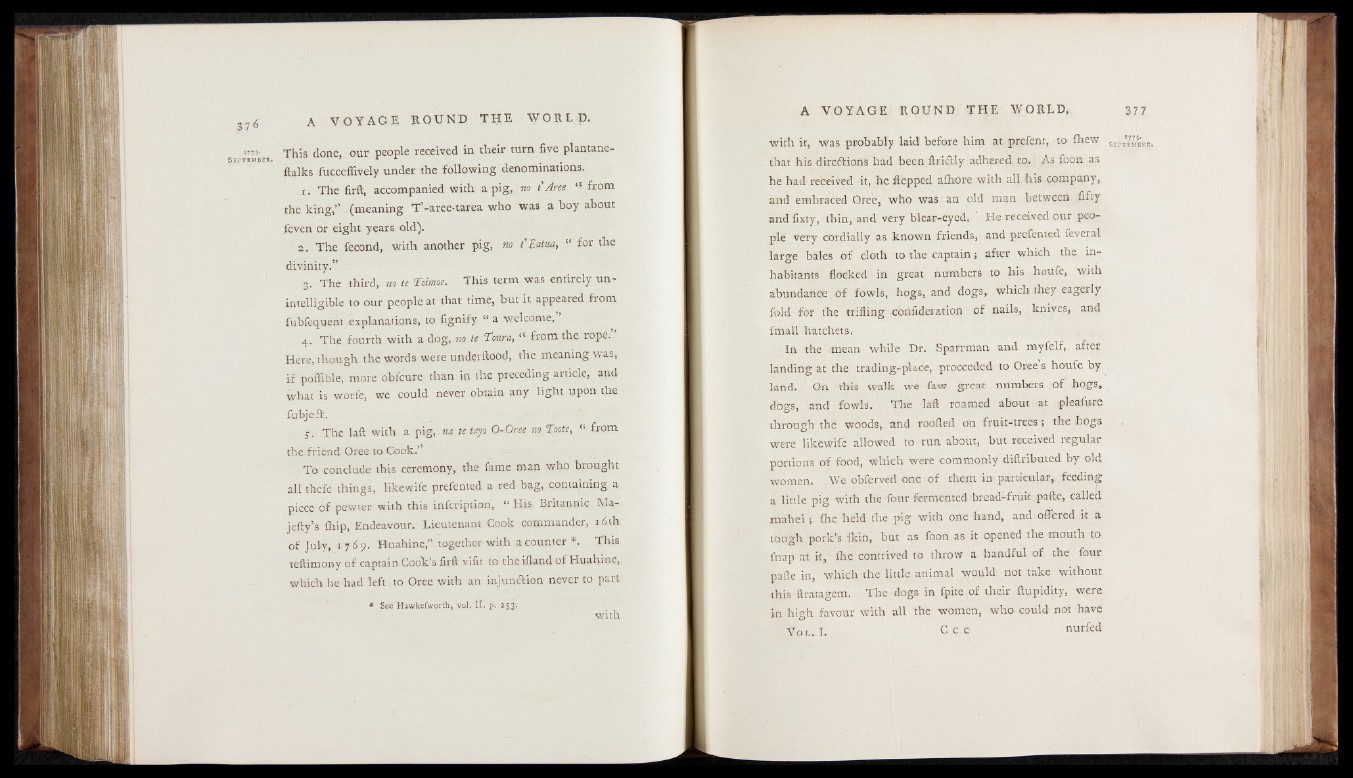
177!- This done, our people received in their turn five plantane-
S eptember. 1 * 7 * A §
ftalks fuccelfively under the following denominations.
1. The firft, accompanied with a pig, no t Aree “ from
the king/’ (meaning T’-aree-tarea who was a boy about
fcven or eight years old).
2. The fecond, with another pig, no t’Eatua, “ for the
divinity.”
3. The third, no te Toimoe. This term was entirely unintelligible
to our people at that time, but it appeared from
fubfequent explanations, to fignify “ a welcome.
4. The fourth with a dog, no te Toura, “ from the rope. ’
Here, though the words were underftood, the meaning was,
if poflible, more obfcure than in the preceding article, and
what is worfe, we could never obtain any light upon the
fubjeft. ,
5. The laft with a pig, w te tayo Q-Oree no Toote, “ from
the friend Oree to Cook.”
To conclude this ceremony, the fame man who brought
all thefe things, like wife prefented a red bag, containing a
piece of pewter with this infcription, “ His Britannic Ma-
jefty’s Ihip, Endeavour. Lieutenant Cook commander, i£>th
of July, 1769. Huahine,” together with a counter *. This
teftimony of captain Cooh’s firft vifit to the ifiand of Huahine,
which he had left to Oree with an injunidion never to part
* See Hawkefworth, vol. II. p. 253.
with
with it, was probably laid before him at prefent, to fhew sEPT' S ER,
that his directions had been ftriftly adhered to. As foon as
he had received it, he ftepped afhore with all his company,
and embraced Oree, who was an old man between fifty
and fixty, thin, and very blear-eyed. He received our people
very cordially as known friends, and prefented feveral
large bales o f cloth to the captain; after which the inhabitants
flocked in great numbers to his houfe, with
abundance o f fowls, hogs, and dogs, which they eagerly
fold for the trifling confideration of nails, knives, and
fm-atl hatchets.
In the mean while Dr. Sparrman and myfelf, after
landing at the trading-place, proceeded to Oree s houfe by
land. On this walk we faw great numbers of hogs,
dogs, and fowls. The laft roamed about at pleafure
through the woods, and roofted on fruit-trees ; the hogs
were likewife allowed to run about, but received regular
portions of food, which were commonly diftributed by old
women. We obferved one of them in particular, feeding
a little pig with the four fermented bread-fruit pafte, called
mabei; fhe held the pig with one hand, and offered it a
tough pork’s fkvn, but as foon as it opened the mouth to
fnap at it, fhe contrived to throw a handful of the four
pafte in, which the little animal would not take without
this ftratagem. The dogs in fpite of their ftupidity, were
in high favour with all the women, who could not have
V ol. I. C c c nurfed